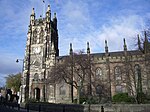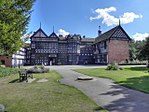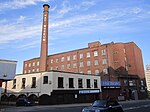
Arkwright Mill, Rochdale is a cotton spinning mill in Rochdale, Greater Manchester. It was built in 1885 by the Arkwright Cotton Spinning Co. It was taken over by the Lancashire Cotton Corporation in the 1930s and passed to Courtaulds in 1964. It was located next to Dale Mill on Roch Street. The ring and doubling frames were made by Howard & Bullough, Accrington. The mill closed in 1980, was demolished in 2007 and the land redeveloped for housing.

Brunswick Mill, Ancoats is a former cotton spinning mill on Bradford Road in Ancoats, Manchester, England. The mill was built around 1840, part of a group of mills built along the Ashton Canal, and at that time it was one of the country's largest mills. It was built round a quadrangle, a seven-storey block facing the canal. It was taken over by the Lancashire Cotton Corporation in the 1930s and passed to Courtaulds in 1964. Production finished in 1967.

Century Mill, Farnworth is a former cotton spinning mill in Farnworth, Bolton, Greater Manchester, England which was built in the early 20th century for ring spinning. It was taken over by the Lancashire Cotton Corporation in the 1930s and passed to Courtaulds in 1964. The 6,674.00-square-metre (71,838.3 sq ft) building is still in use for various other purposes in 2016.

Fox Mill was a cotton spinning mill in Hollinwood, Oldham, Greater Manchester, England. It was taken over by the Lancashire Cotton Corporation in the 1930s and passed to Courtaulds in 1964.
Palmer Mills were cotton spinning mills in Portwood, Stockport, Greater Manchester, England. Built in the late 19th century, they were taken over by the Lancashire Cotton Corporation in the 1930s and sold on. Renamed the Stockport Paper Mill, they survived into the 21st century when they were demolished to be replaced by modern businesses.
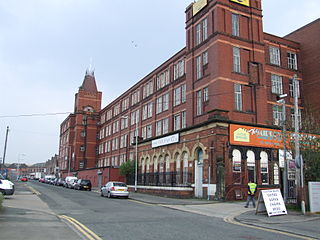
Vernon Mill is a former cotton spinning mill in Portwood, Stockport, Greater Manchester, England. Built in 1881, it was taken over by the Lancashire Cotton Corporation in 1930 and later sold on. Although still in business use, it is now a grade II listed building.
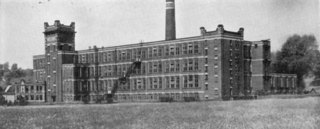
Welkin Mill, Lower Bredbury is a cotton spinning mill in Lower Bredbury/Portwood, Stockport, Greater Manchester. It was built in the early years of the 20th century for ring spinning. It was taken over by the Lancashire Cotton Corporation in the 1930s and passed to Courtaulds in 1964. Production ended in 1967. The 162,000 sq ft (15,100 m2), four-storey mill occupies a 5.15 acres (2.08 ha) site on Welkin Road.

Saxon Mill, Droylsden was a cotton spinning mill in Droylsden, Tameside, Greater Manchester, England. It was built in the 1907, taken over by the Lancashire Cotton Corporation in the 1930s and passed to Courtaulds in 1964. Production finished in 1967, and the mill was demolished in 1995.

Stalybridge Mill, Stalybridge is a cotton spinning mill in Stalybridge, Tameside, Greater Manchester, England. It was built in 1868, and the engine reconfigured in around 1925. It was taken over by the Lancashire Cotton Corporation in the 1930s and passed to Courtaulds in 1964.

May Mill was a cotton spinning mill in Pemberton, Wigan, Greater Manchester, England. Historically in Lancashire, it was built in 1889. It was taken over by the Lancashire Cotton Corporation in the 1930s and passed to Courtaulds in 1962–63 to produce carpet fibre, which it continued to do until its closure on 17 October 1980.
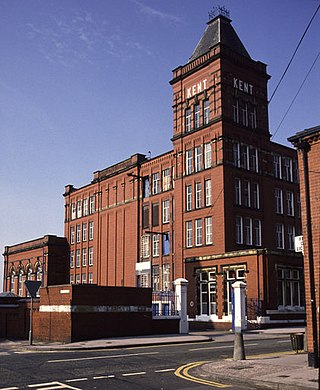
Kent Mill, Chadderton was a cotton spinning mill in Chadderton, Oldham, Greater Manchester. It was built in 1908 for the Kent Mill Co. It was taken over by the Lancashire Cotton Corporation in 1938 and passed to Courtaulds in 1964. Production finished in 1991 and it was demolished in 1994.

Monton Mill was a cotton spinning mill in Eccles, Greater Manchester, England, built in 1906. It was taken over by the Lancashire Cotton Corporation in the 1930s and passed to Courtaulds in 1964. After production ended, it was demolished and replaced with housing; its name is preserved in the street name.

Textile Mill, Chadderton was a cotton spinning mill in Chadderton, Oldham, Greater Manchester, England. It was built in 1882 by Potts, Pickup & Dixon for the Textile Mill Co. Ltd, and closed in 1927. It was taken over by the Lancashire Cotton Corporation in the late 1940s and passed to Courtaulds in 1964 and used for cotton waste sorting. Half of the building was destroyed by fire on 11 July 1950, but the remaining section continued to be used for cotton waste sorting by W. H. Holt and Son until 1988.

Elm Mill, was a four-storey cotton spinning mill in Shaw and Crompton, Greater Manchester, England. It was built in 1890 for the Elm Spinning Company Ltd., and was called Elm Mill until it closed in 1928. It was revived by the Lancashire Cotton Corporation in 1929 and called Newby Mill. LCC and all their assets passed to Courtaulds in 1964. Production at Newby finished in 1970, and it was used for warehousing. Subsequently, named Shaw No 3 Mill, it became part of Littlewood's Shaw National Distribution Centre. It was demolished to make way for housing in 2022.
Majestic Mill, Waterhead is a cotton spinning mill in Waterhead, Oldham, Greater Manchester. It was built in 1903. It was taken over by the Lancashire Cotton Corporation in the 1930s and passed to Courtaulds in 1964, converted to ring spinning in 1971. Production finished in 1982. Still standing in other use.
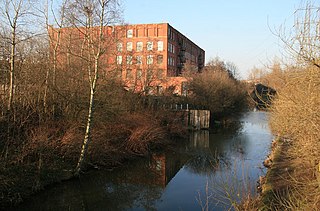
Malta Mill, Middleton is a former cotton spinning mill in the Mills Hill area of Chadderton, Greater Manchester. It lies alongside the Rochdale Canal. It was built in 1904 as a new mule mill, by F. W. Dixon The engine stopped in 1963. The building still stands.

Laurel Mill was a cotton spinning mill in the Mills Hill/Middleton Junction area of Chadderton, Oldham, Greater Manchester, England.
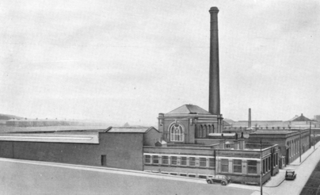
Harp Mill was a former cotton spinning mill in the Castleton, Rochdale, Greater Manchester, England. Queensway, Castleton was a hub of cotton mills including the three 't', Th'Arrow, Th'Harp, and Th'Ensor. The 1908 Castleton map includes: Marland Cotton Mill, Castleton Cotton Mill, Globe Works, Arrow Cotton Mill, Harp Cotton Mill, Globe Leather Works, Castleton Size Works and Castleton Iron Works. Th'Harp was built in 1908 for the Harp Doubling Company and was taken over by the Lancashire Cotton Corporation in 1938. The mill closed in 1958, and was sold to the hosiery manufacturer N. Corah Ltd.

Mars Mill was a former cotton spinning mill in Castleton, Rochdale, Greater Manchester, England. Castleton joined the Borough of Rochdale in 1899. Queensway, Castleton was a hub of cotton mills; Mars, Marland, and Castleton Mill were a group of three. It was taken over by the Lancashire Cotton Corporation in 1935 and passed to Courtaulds in 1964 and demolished in the 1990s; Marland survived until 2004.

Elder Mill, Romiley was a cotton spinning mill in Romiley, Stockport, Greater Manchester. It was taken over by the Lancashire Cotton Corporation in the 1930s and passed to Courtaulds in 1964.























